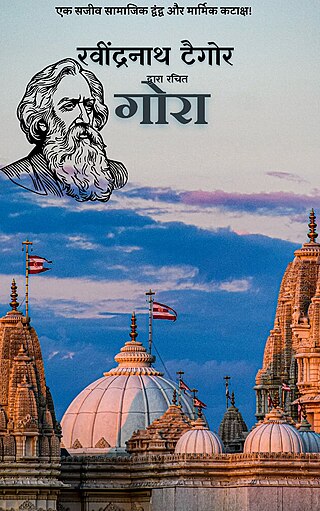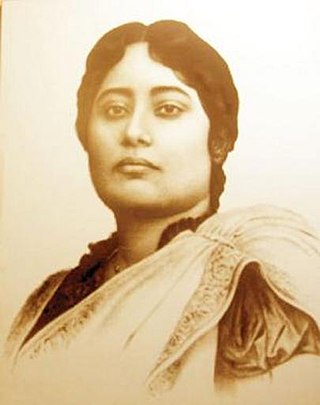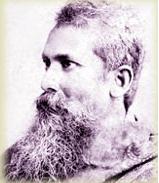Related Research Articles

Jana Gana Mana is the national anthem of the Republic of India. It was originally composed as "Bharoto Bhagyo Bidhata" in Bengali by polymath Rabindranath Tagore on 11 December 1911. The first stanza of the song Bharoto Bhagyo Bidhata was adopted by the Constituent Assembly of India as the National Anthem on 24 January 1950. A formal rendition of the national anthem takes approximately 52 seconds. A shortened version consisting of the first and last lines is also staged occasionally. It was first publicly sung on 27 December 1911 at the Calcutta Session of the Indian National Congress.

Rabindranath Tagore is a 1961 Indian documentary film written and directed by Satyajit Ray about the life and works of noted Bengali author Rabindranath Tagore. Ray started working on the documentary in early 1958. Shot in black-and-white, the finished film was released during the birth centenary year of Rabindranath Tagore, who was born on 7 May 1861. Ray avoided the controversial aspects of Tagore's life in order to make it as an official portrait of the poet. Though Tagore was known as a poet, Ray did not use any of Tagore's poetry as he was not happy with the English translation and believed that "it would not make the right impression if recited" and people would not consider Tagore "a very great poet," based on those translations. Satyajit Ray has been reported to have said about the documentary Rabindranath Tagore in his biography Satyajit Ray: The Inner Eye by W. Andrew Robinson that, "Ten or twelve minutes of it are among the most moving and powerful things that I have produced."

Rabindranath Thakur (; pronounced[roˈbindɾonatʰˈʈʰakuɾ]; was an Indian polymath who worked as a poet, writer, playwright, composer, philosopher, social reformer, and painter of the Bengal Renaissance. He reshaped Bengali literature and music as well as Indian art with Contextual Modernism in the late 19th and early 20th centuries. Author of the "profoundly sensitive, fresh and beautiful" poetry of Gitanjali, in 1913 Tagore became the first non-European and the first lyricist to win the Nobel Prize in Literature. Tagore's poetic songs were viewed as spiritual and mercurial; where his elegant prose and magical poetry were widely popular in the Indian subcontinent. He was a fellow of the Royal Asiatic Society. Referred to as "the Bard of Bengal", Tagore was known by the sobriquets Gurudeb, Kobiguru, and Biswokobi.

Suchitra Mitra was an Indian singer, composer, artist exponent of Rabindra Sangeet or the songs of Bengal's poet laureate Rabindranath Tagore, professor, and the first woman Sheriff of Kolkata. As an academic, she remained a professor and the Head of Rabindra Sangeet Department at the Rabindra Bharati University until 1984. Mitra was a playback singer in Bengali films and was associated for many years with the Indian People's Theatre Association.

Jôdi Tor Dak Shune Keu Na Ase Tôbe Ekla Chôlo Re, commonly known as Ekla Chôlo Re, is a Bengali patriotic song written by Rabindranath Tagore in 1905.
Adi Dharm refers to the religion of Adi Brahmo Samaj the first development of Brahmoism and includes those Sadharan Brahmo Samajists who were reintegrated into Brahmoism after the second schism of 1878 at the instance of Devendranath Tagore. This was the first organised casteless movement in British India and reverberated from its heart of Bengal to Assam, Bombay State, Punjab and Madras, Hyderabad, and Bangalore.

Kadambari Devi was the wife of Jyotirindranath Tagore and daughter-in-law of Debendranath Tagore. She was ten years younger than her husband, whom she married on 5 July 1868, at the age of nine. Her husband arranged for her to be educated. She was nearly the same age as her brother-in-law Rabindranath Tagore, being only two years older than him.

Vālmīki-Pratibhā is an opera by Rabindranath Tagore. The Bengali libretto was written by Tagore himself based on the legend of Ratnakara the Thug who later became Sage Valmiki and composed Ramayana, a Hindu epic.

Himangshu Dutta was a Bengali music director. Amongst several contemporary legendary composers of his time as Rabindranath Tagore, Kazi Nazrul Islam, and Atulprasad Sen, Dutta is renowned for his unique and melodious composition of music. Songs composed by him is usually known as "Himangshu Dutta-er Gaan". The Saraswat Samaj of Dhaka awarded him the title 'Surasagar' for his contribution to Bengali music. He himself was an accomplished singer as well.
Lalit Chandra Nath popularly known as Lalit Oja or Lalit Chandra Nath Oja was a notable person from Assam. He was born to a poor family in Saatghoriya Gaon, Sipajhar, Darrang district in 1923. His father Bhuban Chandra Nath was also an Sukananni Oja. Faguni Devi was his mother. He has been awarded the prestigious Sangeet Natak Akademi Award in 1983 and again in 2012 the same organization honoured him with the Rabindranath Tagore award for his expertise in Sukananni Ojapali and for contribution in popularizing this traditional folk art form. He has performed Ojapali and Deodhani dance in various places in and outside India.

Kadambari (2015) is a Bengali film directed by Suman Ghosh and produced by Rakesh Singh. The music of the film was composed by Bickram Ghosh. This is a biopic of Kadambari Devi, the sister-in-law of Rabindranath Tagore and Konkona Sen Sharma and Parambrata Chatterjee played the lead roles.

Gora is a novel by Rabindranath Tagore, set in Calcutta, in the 1880s during the British Raj. It is the fifth in order of writing and the longest of Tagore's twelve novels. It is rich in philosophical debate on politics and religion. Other themes include liberation, universalism, brotherhood, gender, feminism, caste, class, tradition versus modernity, urban elite versus rural peasants, colonial rule, nationalism and the Brahmo Samaj.
Below is a list of adaptations of works of Rabindranath Tagore in film and television.
Bou Thakuranir Haat is a 1953 Bengali drama film directed by Naresh Mitra based on a novel of Rabindranath Tagore of the same name, published in 1883. This film was released under the banner of Emar Productions. It stars Uttam Kumar, Pahadi Sanyal in the lead with Sambhu Mitra, Bhanu Bandyopadhyay and others. Uttam Kumar learned horse riding and sword fighting for the character. The film was not a commercial success, but Uttam Kumar's performance was praised by critics the and media.
Noukadubi is a Bengali drama film directed by Naresh Chandra Mitra based on a 1906 novel of the same name of Rabindranath Tagore. This film was released on 19 September 1947 under the banner of Bombay Talkies. This is a remake of 1946 Hindi film Milan made by the director Nitin Bose where Dilip Kumar starring in the lead role. It was among the big Bengali grossers of 1947.

Mrinalini Devi was a translator and the wife of Nobel laureate poet, philosopher, author and musician Rabindranath Tagore. She was from the Jessore district, where her father worked at the Tagore estate. In 1883, at the age of nine, she married Tagore.
The following is a list of notable people associated withVisva- Bharati University and/or Santiniketan, a neighbourhood in Bolpur city in West Bengal, India:

Dwijendranath Tagore was an Indian poet, song composer, philosopher, mathematician and painter. He was one of the pioneers of shorthand and notation in Bengali script. He was the eldest son of Debendranath Tagore and the eldest brother of Rabindranath Tagore.

The 1913 Nobel Prize in Literature was awarded to the Bengali polymath Rabindranath Tagore (1861–1941) "because of his profoundly sensitive, fresh and beautiful verse, by which, with consummate skill, he has made his poetic thought, expressed in his own English words, a part of the literature of the West." He is the first and remains only the Indian recipient of the prize. The award stemmed from the idealistic and accessible nature of a small body of translated material, including the translated Gitanjali.
Giribala is a Bengali silent drama film directed by Madhu Bose based on the same name short story of Rabindranath Tagore. This film's name was initially Manbhanjan, which was changed to Giribala by the suggestion of Tagore himself. The movie was released on 15 February 1929 under the banner of Madan Theatre. Tagore was present at the first show of the film and he expressed his satisfaction towards the movie Giribala.
References
- ↑ Ashish Rajadhyaksha, Paul Willemen (10 July 2014). Encyclopedia of Indian Cinema. Routledge. ISBN 9781135943189 . Retrieved 7 January 2019.
- ↑ Rabindranath Tagore (20 May 2013). The Rats' Feast: A Tagore Omnibus. Hachette India. ISBN 9789350095591 . Retrieved 7 January 2019.
- ↑ "Gora" . Retrieved 7 January 2019.
- ↑ Mukerjea, Anit (15 August 2015). "Revisiting a classic". The Statesman. Retrieved 15 March 2019.